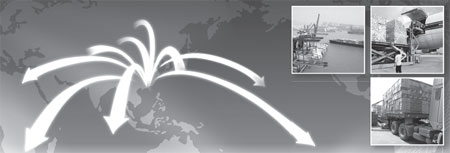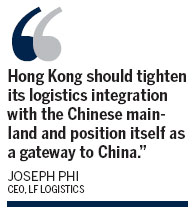Wake-up call for HK to boost hub status
Updated: 2013-01-12 06:46
By Wong Joon San(HK Edition)
|
|||||||


City either to become super hub for Northeast and Southeast Asia, or be relegated as a secondary option in Asia's logistics industry. Wong Joon San reports.
Over the last few months, many have not only voiced their concerns about Hong Kong's competitiveness, but have also put forth many constructive views on what should be done by the city, or face the consequences of becoming a second-tier city compared with its rivals on the Chinese mainland.
LF Logistics CEO Joseph Phi, who spoke on the topic "Asia & HK: The Path Ahead" at a recent conference in Hong Kong, said if Hong Kong is to achieve the status of a super hub of Northeast Asia, then it has to carry out a number of initiatives.
"First, Hong Kong has to become involved in the Free Trade Agreements in the region, like the ASEAN plus One and plus Three, which is being talked about right now," he says, while pointing out that the territory is right now not involved.
Over the last few years the institutionalization of the ASEAN Plus Three (APT) process has started to take shape. Government leaders, ministers, and senior officials from the ASEAN, and the three Northeast Asian states - China, Japan, and South Korea - that together comprise the participants in the process are consulting on an increasing range of issues.
The APT's emergence raises questions about relations between it and other regional groupings such as the Asia-Pacific Economic Cooperation (APEC) forum and ASEAN itself, as well as about the overall prospects for its future development. There are a number of obstacles to this development that arise from the many differences among the countries of East Asia.
The combined effect of such key developments as an increase in regionalization; the success of other regional organizations and arrangements such as the European Union (EU) and the North American Free Trade Agreement (NAFTA); the now-apparent limitations of ASEAN and APEC; and the impact of the Asian economic crisis have been enhancing the significance of the APT process. Indeed, the APT now has the potential to become the dominant regional institution in East Asia.
As such, Phi says, Hong Kong should do something about it, and very quickly. "Second, Hong Kong should tighten its logistics integration with the Chinese mainland and position itself as a gateway to China.
"Third, the city should continue to enhance its logistics infrastructure and capabilities," he says.
Phi warns that Hong Kong, which only had a more than 5 percent GDP growth in 2011, depends on the slower growing Pearl River Delta and will be relegated as the secondary hub in NE Asia if the territory did not pull up its socks.
He points out that Hong Kong is much smaller compared with Shanghai, whose GDP growth was more than 8 percent in 2011. Furthermore, Shanghai is forging strongly ahead due to the faster growing Yangtze River Delta economy.
Commenting on the subject, Paul Tsui, chairman of the Hong Kong Association of Freight Forwarding & Logistics Ltd, says generally small and medium-sized enterprises (SMEs) were today facing huge rising costs in trading such as increasing insurance premiums that was a big burden for them.
This, coupled with rising rental and labor costs in the city, are not helping the industry, which is already reeling from the impacts of the weak US demand and the eurozone crisis, he said, adding that the stronger yuan currency against the Hong Kong dollar was not making it easy for businesses to survive as they had very low profit margins.
Tsui said Haffa had put forward several proposals to the government to help the SMEs, including drawing up a master plan for strategic logistics development in the city, but nothing has happened so far.
Tsui said he had recently spoken to the new Chief Executive Leung Chun-ying about providing more back up land to store containers in the Kwai Tsing area, but nothing had been done so far. He points out that whenever the government put up a piece of land for sale by auction in the Kwai Tsing area, it was usually snapped up by car park operators who could offer much higher prices than logistics services providers.
So, the problem of lack of backup land in Kwai Tsing container terminals was getting worse by the day, as there was no solution with the necessary land.
Containers from south China were being delivered to Hong Kong by container trucks, but the serious shortage of back up land for storing these containers made the problem really serious. Presently, over 50 percent of the containers flowing into Hong Kong's Kwai Tsing container terminals were brought in by barges.
Tsui said: "The government structure is too complicated and no one is able to lead the departments on this subject matter as it involved multiple bureaus." He added that if something was done about it, then the Secretary of the government had to head the coordination of the various related departments to make it happen.
So, the feeling in the logistics industry is that this sector is not likely to get any priority among the several pressing matters facing the Hong Kong government.
In this respect, the question of whether Hong Kong's status as a super hub is going to improve or decline will depend on how many pro-active measures will be taken by businesses and the government in the near future.
(HK Edition 01/12/2013 page2)